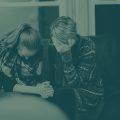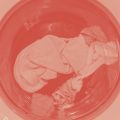After the Leftovers
In early 2020, awash in the emotional lows of the early pandemic, the three of us decided to cope with the uncertain, monotonous days by starting a long-distance "TV club." Though we all went to the same college, we'd ended up in different states and in different careers since graduating — Cecilia, a program manager for a suicide prevention nonprofit in Colorado; Hannah, a high school English teacher in California; and Olivia, a graduate student in Pennsylvania. Separated in space but yearning for social interaction and connection, we embarked on a book club-style viewing of various TV shows, watching episodes "together" (in time and in feeling) by pressing play at the same time, and texting each other our reactions and commentary. By that fall, we decided our next show should be The Leftovers. At the time, we neither explicitly discussed the now-obvious-seeming parallels between the Sudden Departure and the pandemic—a rapture-like event causing a percentage of the global population to vanish, and a pandemic wiping out millions of lives across the world—nor did we register the poignancy of that resonance on a conscious level.
Now, looking back, we feel the weight of what it means to sit with each other during the pandemic, to carve out space for each other during a time wracked by a feeling of crisis, a time of institutions failing, of a loss of normalcy, of isolation and fear, of uncertainty, grief, and death — that is, to find community in "departure." Watching The Leftovers amid the pandemic speaks to the power television (and art more generally) has to soothe and suture, but also to unsettle and unearth questions about what it means to try to survive together, to live through crisis, and to remember it.
***
Cecilia Reynolds: So, the pilot of The Leftovers is set three years after the Sudden Departure, and we finished writing this around four years after the start of the pandemic. There is a thread there about what it means to look back upon a world changing event and begin to reflect upon it.
Olivia Stowell: I didn't realize that! It feels strange to think that that much time has passed. But I think that the past few years have also revealed how much crisis events warp our sense of time. 2020 feels both much further away and much closer than three years, to me. And I think that feels right to how we land in the Leftovers universe in the pilot — the Sudden Departure feels both closer and further away than that. And maybe even feels differently near or distant in time for different characters too.
CR: Absolutely. A therapist once told me that our brains can't process trauma while we are in it. So often in crisis, we are simply in survival mode and the processing can't even begin until years later. It feels like that is where we enter the show, and in some ways, where we as a society still are now.
Hannah Krieshok: Totally, and even though I didn't think about the parallels much at the time, looking back, COVID makes me understand the anger the Guilty Remnant [GR] had in The Leftovers. As a high school teacher, there's a bracketed age group I've noticed in my students who were old enough to realize that the pandemic brought to light a lot of issues that many have since tried to smooth over or not address, so now we have this group of young people who are like "we saw everything that was wrong and then nobody did anything about it." And so because of that, they have an undercurrent of anger that makes them less hopeful for the future, and I think the Guilty Remnant were responding with a similar type of resentment.
OS: And I think there's also a resonance there too in the question of who gets to move on from a crisis event, and why — who gets to resume something like normalcy, and for whom is that not even possible. With the GR, it's very much this sense of being unwilling to forget, even if that remembering manifests in ways that are antisocial or violent. Whereas for our "real" world, those who have been left behind are by and large those who are vulnerable and marginalized — who can't go certain places or do certain things because a majority of society has decided to behave as though the crisis is over.
***
CR: What strikes me as I think about The Leftovers is that it's one of the rare TV shows that had an impact on my mood outside of when I was watching it. I typically watch TV as a form of escapism. While I certainly love an occasional tear-jerker, I tend towards lighter media: reality TV, sitcoms, and shows I've seen before are all sources of comfort. With The Leftovers, I often turned off the television after an episode feeling unsettled, the weight of what the characters were facing feeling embodied within me. Unlike most other content I (and the rest of the world . . . I'm looking at you, Tiger King) was consuming while primarily housebound, I couldn't binge The Leftovers. I had to let each episode, and myself, breathe.
At the beginning of the pandemic, I was two years into my work at a small nonprofit that centered on suicide prevention. My work was primarily with young people, and I spent a lot of time in schools teaching youth about suicidality, warning signs, and seeking ways to collaborate to support their mental health. When schools went virtual, suddenly I found myself in an online world right alongside students, trying to create spaces of vulnerability and conversation amidst a time of mental health crisis. For the first time in my role, I questioned if what I was doing was making a difference, if anything I was saying was getting through the distance between screens.
The trouble with prevention work is that you will never truly know the impact. Will this student get the help they need? Prevention work online amplified this feeling a thousand times over. Trying to offset some of the deep stress and sadness I was experiencing, I had a lot of boundaries around the media I let into my after-work spaces. When I came home from a workday that primarily revolved around suicide, I wanted light, funny, distracting content. I had a rule for myself: I was not interested in shows that portrayed suicide, or heavily portrayed depression or other mental illness. The Leftovers includes all of these, and yet somehow still made its way into my heart.
In retrospect, I have to ask myself what it is about this show that made it the exception to my rule. I think it was the undertones that depicted what we all were experiencing in real time — an unforeseen event revealing the cracks in our society's foundation and spurring global grief. My work has led me to believe that our society fails grievers, never allowing enough time and space for the fullness of grief and the way it rises and falls. Grief is meant to be known, to be honored by communities. In the years since the pandemic's onset, we as a nation have failed to honor our collective loss and collective pain. We make individuals fully carry their own losses (whether the loss be a person, a job, stability, health, and on and on) on their own. The Leftovers instead depicted what it was like to go through something together. The Guilty Remnant in particular captured me, and the way they as a unit refused to let their grief be unheard and unseen. Even in their silence they made it known that they were here, and they were hurting. How rare is it that we give grief, or mental illness, that same volume?
These big questions and their heaviness did not make me feel better, but they did make me feel known. The Leftovers also held on to me, one episode at a time, by the spiritual and religious clinging that the characters experienced, which felt so akin to some of my own desperate desire to find deep, meaningful faith when existing systems have failed me. As characters wrestled with their faith and their grief, they did not abandon either. I needed to finish the show because I needed to know how the characters maintained their belief systems even without any answers or closure to their pain. If they could do it, maybe I could too. Maybe I could stay in this field, with all its grief and pain, without answers or closure to that big question: Does what I do matter?
Maybe I will never know, and yet I still have to believe that it does.
***
OS: We all grew up in religious environments, and we met and became friends in an explicitly Christian space. For me personally, The Leftovers' depiction of belief and doubt is one of the parts of the show that remains the most compelling to me. I think a lot about like, Holy Wayne taking away Nora's pain by hugging her, or Matt going into the stocks in the camp outside Jarden in an attempt to find redemption for himself, or Kevin looking for spiritual or "magical" solutions to his mental health problems. Both the faith and the doubt of The Leftovers' central characters feel palpably real to me. But do those aspects of the show hit as hard for you two as they do for me?
HK: I will be so honest, I still don't really understand Holy Wayne. But I kind of like that. I tended to approach a lot of the belief systems we see in The Leftovers with the same kind of skepticism I had about most forms of spirituality at the time, but seeing the variety that were all portrayed with equal merit or respect or validation made me rethink a bit. I needed to get less judgmental of and reactive to religion and faith, and being able to view those as responses to catastrophe and ways of making sense of the world helped me become more truly empathetic to the belief systems I saw in my own life, including my past self, if that makes sense. For a time while I deconstructed and started to move away from Christianity, I grew very cynical. I had been raised on a very all-or-nothing (where "nothing" means Hell) faith, so when I was reckoning with the lack of space for my queer identities in that faith, it was hard to imagine not throwing the baby out with the bathwater. But I think the portrayals of faith in The Leftovers illustrated that belief doesn't have to be an all-consuming way of life.
CR: The spiritual element was definitely part of what made me stay with the show. In media and in real life, I am so captured by and curious of people who experience true conviction in their faith. I was raised deeply Catholic, and I am no longer Catholic. For all of religion's faults, I miss feeling like I was sure of something. Or even better, embracing all the uncertainty and doubt and believing anyways. Embracing the mysteries of faith. The Leftovers portrayed belief systems that were born out of desperation as people tried to make sense of what happened to them. Thinking about that theme in relation to the pandemic, I don't know if the experience was the same. In real life, it seemed like a lot of Christian religious responses were tied to denial (around the vaccine or the legitimacy of the virus's threat), while in The Leftovers the religious structures were the ones not in denial about what happened, and instead were the ones calling the world to remember and change, even if in disturbing ways. But the show still nailed religion and belief as a tool to carry on and make sense of unbearable tragedy.
OS: In the episode I mentioned earlier — aptly named "No Room at the Inn" — where Matt is trying to get wristbands for himself and his wife so they can go into Jarden, the episode ends with that Regina Spektor song "Laughing With." The final lyrics there are "No one's laughing at God / we're all laughing with God," and as far as needle drops go, it's a touch on the nose, but I also think there's something of a thesis statement there for how the characters in The Leftovers relate to a sense of God, or something divine.
CR: Oh my gosh, Olivia, now you've got me thinking about The Leftovers theme song that we are introduced to in season 2, "Let the Mystery Be" by Iris DeMent. Which for me is a great personal summation of where I am at with my faith, and was introduced to me in this show. I remember we all deeply resonated with it. Now I am going to cry!
OS: The way she sings "carrots and little sweet peas"! I remember there was one point, somewhere in season 2, where we briefly discussed getting "Let the Mystery Be" tattoos.
HK: Sometimes people ask me if I'm religious and it's such a complicated question that I should just start sending them the link to that song and the trailer for The Leftovers.
***
HK: The other day I was talking to one of my students about the TV show LOST (another Damon Lindelof project), and he said he didn't like the ending because of "all the Christianity." Hearing him say that felt so wild to me because I thought of it as almost the opposite; I read the finale as subverting Christianity by making use of its icons and tenets in a way other than the deeply fundamentalist understandings of the religion I had grown up with. But for someone who grew up in a different faith context, I realized that it fell into that same bucket of Christianity — even playing with it was still a way of portraying it.
I think that conversation with my student helped me understand how The Leftovers fits into my own religious journey. What may seem to some like a focus on religion, specifically Christianity, or even an endorsement of it, to me was an examination of its flaws that gave me permission to view religion more openly and holistically. As the characters in The Leftovers grappled with the inadequacy of religion to understand the scale of tragedy they experienced, I also was working through the inadequacy of the religion I was raised in to understand the complexities of my life, not to mention our own global tragedies. I wanted and was ready to change my framework for understanding, but without necessarily losing the emotional tether it had provided me, and The Leftovers' portrayal of its characters' belief systems helped me develop my own.
The show makes literal certain mysteries of faith (such as Matt meeting g[G?]od on the lion cruise), sets up icons with biblical-scale symbolism (the deer in season one particularly), and shows a variety of levels of holding to religion or something like religious belief (from Kevin to the people of Jarden to the Guilty Remnant). All the while it remains incredibly emotionally grounded in the melancholy that is a life where some things feel irreconcilable with each other, which gave me a sense of hope and peace that I could let go of, or excise, elements of my past beliefs without becoming unmoored.
That's what has stuck with me the most — the melancholy. At the time we were watching, I almost didn't notice the parallels between the Departure and the pandemic, in part because the show is set post-crisis, whereas our present was mid-crisis, so it was hard to conceptualize the two as related. We weren't yet in the "rebuild/trying to figure out how to move on" stage. Looking back now, it's interesting to think about the potential parallels between how we're coping and rebuilding, and how we saw it in The Leftovers, and it probably has subconsciously influenced the way I think about our current rebuilding. I'm definitely more on the lookout for cults, if nothing else. But in seriousness, I do think I grew up more and coped better because I had as a foundation the show's reconciliation of melancholy by revealing how it is inextricably linked to love and belief, even when they feel mutually exclusive. It textured my worldview and allowed me to appreciate the melancholy in a way I hadn't been able to before.
It was appropriate (perhaps necessary) timing to arrive at this appreciation. After losing a student to suicide days before the pandemic shut down schools, cutting me off from the rest of my students and colleagues who had become a support system, it became both difficult and imperative to hold on to love and belief. With any loss, love becomes more complicated. As a teacher, the life cycle of love and loss is familiar — my professional life is a series of investments and endings, whether it's the end of a class, a graduation, or a tragedy. When faith was my life, I could make sense of endings and tragedies through that lens. Without some kind of belief, everything was just sad and would always end up sad.
Often, in The Leftovers, characters don't find what they're looking for and their problems aren't solved. And yet they keep living. I was struck by the "and yet" of it all. I struggle with the "and yet." I am grieving, and yet there are 174 students who still exist and cry and laugh in front of me. We're in a catastrophic pandemic, and yet kids are forming relationships and playing games through Zoom. One of my friends described it as being forced to reckon with the sunset. Life is falling apart, and yet the sky is still vibrant and lovely and undeniable.
My belief became that I can hold both. Not to say that the loss makes the love mean more or anything, I don't think we should pit them against each other like that. But to me the melancholy of life is that they both exist, it's the "and yet." Sadness becomes melancholy because love endures, and I have to believe that this will continue to be the case and that the love cannot be negated by the endings.
The pandemic separated people physically more than ever, and yet I stumbled upon one of the most significant ways I could stay connected with people. Being able to watch TV "with" two of my closest friends was a saving grace. While we made memories and were brought closer by watching more lighthearted things like Glee and Riverdale, going on the emotionally intense journey of The Leftovers was healing for me. With the overlap of the characters experiencing/recovering from trauma, my individual experience of trauma, and the large-scale general trauma of the pandemic, these processes collapsed and connected. Watching The Leftovers became cathartic, not only because I got to — sort of — spend time with my friends, but also because when I struggled to know how to grieve, either the rest of the world or the characters in the show were grieving and I was able to enter in rather than having to find my way alone.
***
HK: I'm realizing that we all entered this show from various places connected to suicide, whether in relation to our personal lives, our professional lives, and/or our communities. In a show where almost all of the principal characters exhibit explicit suicidality, I was worried at first that watching The Leftovers would be too depressing, and while it doesn't shy away from making you uncomfortable, I wasn't ultimately sad, and I came away from it all with a lot of hope. Do you two think of The Leftovers as a hopeful show?
CR: I think it ended up feeling hopeful to me, but it did not feel that way for me at all at first. I had a hard time getting past the initial loss and sadness of it all. I came around to thinking it's a hopeful show (probably around the same time I came around to more hope in my personal and work life). In Sean T. Collins's recap of the final episode, they write that the finale is ultimately "a desperate person asking to be believed, and another desperate person believing."1 There's something about believing a person could be found in a world where people disappeared and could not be found, holding on to that belief when the entire world context would lead you to believe the opposite. To me, that is hope being answered by faith. And that is The Leftovers.
HK: I think it is a very hopeful show, but it's also devastating. One thing about Damon Lindelof's work is that he's good at portraying things that are practically or physically not realistic but are still emotionally realistic. It's almost like magical realism, or has a similar function to magical realism in that way. It toes the line between reality and exaggerated reality/muted reality and gets right at the emotional core. So for me at least, I was almost tricked into feeling the emotions more deeply than I do with media that's more "realistic." And I think that's part of why it ended up being such a hopeful experience for me—it felt very real and because I was able to suspend my emotional disbelief, I worked through the grief and doubt and found the belief and hope along with the show's arc.
OS: I actually think that for me, The Leftovers is kind of a mood-lifter. I think The Leftovers is funny.
HK: The lion cruise.
CR: I think about the lion cruise all the time. Usually, I just laugh. It is such an absurd but perfect example of the show. There are going to be elements that have a shock factor (a lion-themed cruise orgy) right next to the most mind-bending example of faith and mystery (meeting God at said event).
OS: But seriously! There is this weird, off-kilter sense of humor to the show alongside the despair and the hope and the catharsis. The Leftovers has such a reputation for being depressing (and so many people I know have found it too depressing to watch all the way through) that I often don't even recommend it to people anymore, even though it's one of my favorite shows. But obviously you two are an exception to that.
***
Olivia Stowell: I first encountered The Leftovers during what I think of as the beginning of my adult life — the fall of 2019. I'd moved from California to Pennsylvania to get my master's degree, to a house I'd never seen in a city I'd never been to. For some reason, during the week before classes started, I decided to start watching The Leftovers. I watched all three seasons that week.
Of the three of us, I was the only one who'd seen The Leftovers before, and I was the one who encouraged us to watch it together. When I think about it, I don't think about it as a bummer of a show, even though it carries that reputation. In part, I think this is because watching it in fall 2019 didn't make me feel down; instead, I feel a chime of recognition in its landscapes of doubt, existential confusion, and grief.
During a particularly low point in my life in college, I once told my therapist that I didn't understand why there was this part of my brain that wanted me to die. Even speaking those words out loud felt terrifying, shameful, like speaking them aloud made it more true, and me more strange, more broken. By the time I moved to Philly, I had done a lot of work to move past those bad times and worse impulses, but watching Kevin's confrontations with his hallucinations of Patti reminded me of where I'd been before. In some way, it felt like seeing that part of my brain, the part of my brain that wanted me to die, dramatized and mediated and reflected back to me. And, in seeing it reflected back, it was as though I was, in the words of the poet Christian Wiman, an inalienable part of "this whole prodigal and all too perishable world in which I find myself, very much alive, and not at all alone."2
Throughout the pandemic and its ongoing fallout, the world has certainly felt all too perishable. And yet, being together through our TV club was one, small, granular way to feel very much alive, and not at all alone. To my mind, The Leftovers is one of the best representations of grief and emotional pain that I've encountered. Watching it with two of my best friends felt like I was exposing the inner workings of some part of my own experience of the world to them. But, at the same time, watching this show that is so important to me with them was, more often than not, joyful and funny. We started referring to Kevin, played by Justin Theroux, exclusively as "Zhustine" for reasons we can now no longer remember (so much so that Hannah's phone still autocorrects "Justin" to "Zhustine"). Every time the Frost twins appeared in season 1, we gleefully would all-caps text THE TWINS simultaneously. But also, we discussed how and why the show affected us the way it did. I shared that Kevin's hallucinations of Patti, urging him to harm himself or take his own life, did not feel unsettling to me so much as they felt familiar.
We finally came back together in person in November 2020 to spend part of the Thanksgiving week together, each of us battling various stresses, worn thin from the global and personal anxieties of the past eight months. We watched the last four episodes of the series (including the iconic and much-beloved-by-us lion sex cult cruise episode) together. When the finale ended, we sat together and cried together as Nora tells Kevin, "So much time had passed. It was too late. And I knew that if I told you what happened that you would never believe me," and Kevin replies, "I believe you. Why wouldn't I believe you? You're here."3
It seems almost silly, writing this now, to ascribe such power to a TV show. As someone who now studies television for a living, it's hard for me to resist the urge to intellectualize our experience, to bring the history of television studies or the methodological tools of textual analysis and reception studies to bear upon The Leftovers and upon our experience of it. Those who know me know I love a good critique, and The Leftovers' symbolic world, its visual language and character arcs and layered themes, of course opens up so much space for hermeneutic pleasure. It invites close reading. But I think, too, that my instinct toward the pleasure of interpretation, toward discussing the metaphoric terrain of the afterlife hotel, or the intertextual references to Perfect Strangers, or the masterful contours of Carrie Coon's expressive face, can be a way to evade the simpler truth that The Leftovers is one of my favorite shows not only because it is great, but because it makes me feel unalone in the world.
On the other hand, my intellectual side also sometimes urges me to dismiss my own feelings and memories of watching The Leftovers (both in fall 2019 and again in fall 2020) as operatic or hyperbolic. I feel almost embarrassed to make so much of how I felt. After all, it's just a TV show. But, in a way, I think The Leftovers, in two crucial times in my life, worked for me in a way not unlike the song "Homeward Bound" works for Kevin in the season 2 finale; it's just a song, and yet joining in singing it helps to tether and return him to the world of the living.
The Leftovers is still just a TV show. But the thing we made of it, during a time when even the most mundane things felt imbued with a sense of crisis, was so much more.
***
HK: Nora and Kevin finding each other during the trauma of the departure and just clinging is honestly how I feel about you two and our TV club, but with less romance.
OS: I hope we never stop watching TV together. If we watched every Disney Channel Original movie together, and literally every episode of Riverdale together, I feel that we can do anything. So, I hope someday we're in the real-life equivalent of Carrie Coon and Justin Theroux's old age makeup from the finale, like, graying and wrinkly, and texting each other about television, as a way to stay in touch and know about each other's lives and inner lives.
CR: I am not one to bright side the pandemic, but this lasting hobby of ours, TV club, choosing television and film as our friendship's regularly shared experience, that has become a very meaningful part of my life.
HK: For me, TV as a medium has been a way to experience my own emotions, and with the big feelings of my personal life and the pandemic, a show with the feelings magnitude of The Leftovers was perfect to allow me to process, but it would not have been the same at all if I had watched it alone.
OS: Same. And I do think it matters that we chose TV as our group hobby. Obviously, our choices for group activities during the pandemic (and even after, because we live so far apart) were limited. But I think there's also something about the way that television has always been a medium of seriality, of continued and ongoing investment over time, and a medium of the domestic space, that's located in the home and is entwined with the daily rhythms and rituals of being in one's own private space.
CR: Yes, and yes. I appreciate how we have taken something that has become often kind of individual and made it very communal. It's my new daily bread. And while some of the media we watch lends itself better to deep introspection, no matter what we are watching, we have found so much value in the collective experience.
OS: So . . . Leftovers rewatch?
Olivia Stowell is a PhD candidate at the University of Michigan, where she studies race and labor in contemporary television and popular culture. Her work has appeared in Television and New Media, Critical Studies in Television, Public Books, Los Angeles Review of Books, ASAP/J, and elsewhere.
Hannah Krieshok is a high school English teacher and aspiring future football coach in Santa Barbara, CA.
Cecilia Reynolds holds a Master's degree in Nonprofit Management from Regis University. She currently works in Northern Colorado as a program director.
References
- Collins, Sean T. "The Leftovers Series-Finale Recap: There and Back Again." Vulture, June 4, 2017.[⤒]
- Wiman, Christian. "Gazing into the Abyss." The American Scholar, June 1, 2007.[⤒]
- The Leftovers. "The Book of Nora." HBO Max video, 1:13:31, June 4, 2017.[⤒]










